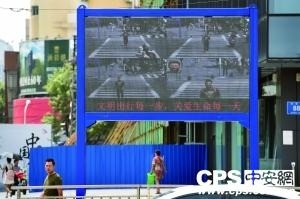Nanjing South Railway Station at 11 o’clock on a Monday morning; I had assumed midday rush hour would slow things down, so I arrived early in anticipation of a long queue.
Yet, I was pleasantly surprised at how fast it moved given the amount of people. I soon realised there was only one staff member present, where had all the others gone?
The people who once cross checked ID cards with train tickets and waved people in were gone. Replaced with face recognition machines, passengers gave it their ticket and a look at their face, swoosh went the saloon doors and in they went.
Not only is face recognition software now used at train stations in Nanjing, it has been installed at ATM machines as well. Next, Nanjing will instate the technology on road intersections.
Pictures of people will be taken crossing the road when the light is red and an alarm will sound and their picture displayed on a large LED screen nearby. Nanjinger’s who are caught will also be ordered to pay a fine of ¥20. This method of shaming people out of reoffending is predicted to work well in China.
The first intersection to have the face recognition systems installed are Hongwu Lu/ Huaihai Lu and Zhongshan Lu/Zhujiang Lu, both areas where jaywalking is prolific.
Beyond Nanjing, face recognition software is creating quite the buzz as tech giant Baidu has provided Jiangying Airport in Nanyang city of Henan province with the country’s first boarding face recognition technology, and China Southern Airlines is the first to use it. No longer will passengers need a boarding pass, foreseen to considerably reduce the amount of time spent at check in and gate.
In addition, Jack Ma has trialled Ant Financial’s (formerly known as Alipay) version of the software at a KFC in Hangzhou. Customers can approach a machine, virtually select the meal and pay via the face recognised option. The software can still be used even if the customer’s phone is switched off.
While all of this proves to be fast, effective innovative and likely to greatly improve the lives of people in China, critics have pointed out privacy concerns. Qingdao police this year, for example, arrested 49 people suspected of drug use at the annual beer festival. The software allowed police to track people coming into the festival and identified those who had a record of drug use, while at the same time capturing a total of 2.3 million faces.
While the technology is still very new, rights groups such as the Electronic Freedom Foundation claim the FBI has 14 million faces saved in its database and that they plan to increase it to 50 million. At the moment, it seems to serve only those that wish to sell us things and law enforcement. At the moment, in a country that needs all the help it can get at ensuring smooth journeys by land, air and sea, the software will help greatly.









